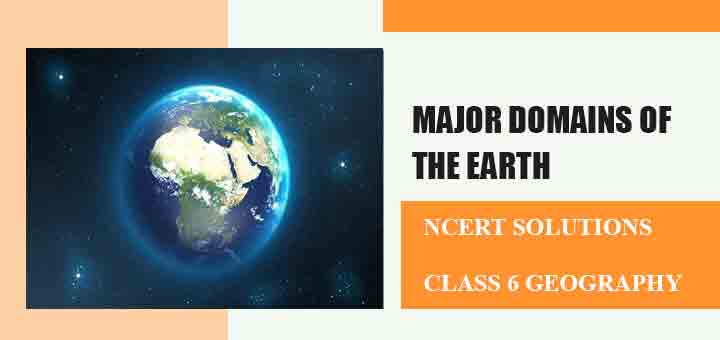NCERT Solutions for Chapter 5 Major domains of the Earth Class 6 Geography
Book Solutions
1(a)
Answer the following questions briefly.
What are the four major domains of the earth?
What are the four major domains of the earth?
Answer
The four major domains of the earth are lithosphere, hydrosphere, atmosphere and biosphere.
Exercises
Page Number 37
1(b)
Answer the following questions briefly.
Name the major continents of the earth?
Name the major continents of the earth?
Answer
The seven major continents of the Earth are Asia, Europe, Africa, North America, South America, Australia and Antarctica.
Exercises
Page Number 37
1(c)
Answer the following questions briefly.
Name the two continents that lie entirely in the Southern Hemisphere.
Name the two continents that lie entirely in the Southern Hemisphere.
Answer
The two continents
that lie entirely in the Southern HemisphereAustralia and Antarctica.
Exercises
Page Number 37
1(d)
Answer the following questions briefly.
Name the different layers of atmosphere.
Name the different layers of atmosphere.
Answer
The different layers of atmosphere are troposphere, stratosphere, mesosphere, thermosphere and exosphere.
Exercises
Page Number 37
1(e)
Answer the following questions briefly.
Why is the earth called the ‘blue planet’?
Why is the earth called the ‘blue planet’?
Answer
The earth is called the 'blue planet' because more than 71 percent of the earth is covered with water.
Exercises
Page Number 37
1(f)
Answer the following questions briefly.
Why is the Northern Hemisphere called the Land Hemisphere?
Why is the Northern Hemisphere called the Land Hemisphere?
Answer
The Northern Hemisphere called the Land Hemisphere because the greater part of Earth’s landmass lies in the Northern Hemisphere.
Exercises
Page Number 37
1(g)
Answer the following questions briefly.
Why is the Biosphere important for living organisms?
Why is the Biosphere important for living organisms?
Answer
The biosphere is the narrow zone of contact between the land, water and air. It is in this zone that life, that is unique to this planet, exists. All the living organisms including humans are linked to each other and to the biosphere for survival.
Exercises
Page Number 37
2
Tick the correct answers.
(a) The mountain range that separates Europe from Asia is
(i) the Andes
(ii) the Himalayas
(iii) the Urals
(b) The continent of North America is linked to South America by
(i) an Isthmus
(ii) a Strait
(iii) a Canal
(c) The major constituent of atmosphere by percent is
(i) Nitrogen
(ii) Oxygen
(iii) Carbon dioxide
(d) The domain of the earth consisting of solid rocks is
(i) the Atmosphere
(ii) the Hydrosphere
(iii) the Lithosphere
(e) Which is the largest continent?
(i) Africa
(ii) Asia
(iii) Australia
Answer
(a) (iii) the Urals
(b) (i) an Isthmus
(c) (i) Nitrogen
(d) (iii) the Lithosphere
(e) (ii) Asia
(e) (ii) Asia
Exercises
Page Number 38
3
Fill in the blanks.
(a) The deepest point on the earth is _____________ in the Pacific Ocean.
(b) The _____________ Ocean is named after a country.
(b) The _____________ Ocean is named after a country.
(c) The _____________ is a narrow contact zone of land, water and air that supports life.
(d) The continents of Europe and Asia together are known as _____________.
(e) The highest mountain peak on the earth is _____________.
(d) The continents of Europe and Asia together are known as _____________.
(e) The highest mountain peak on the earth is _____________.
Answer
(a) Mariana Trench
(b) Indian
(c) Biosphere
(d) Eurasia
(e) Mt. Everest
(b) Indian
(c) Biosphere
(d) Eurasia
(e) Mt. Everest
Exercises
Page Number 38